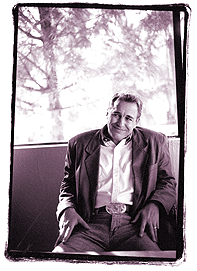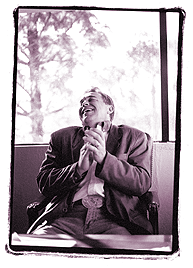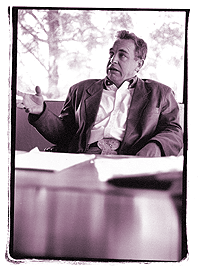
MATT SALMON doesn't look like a revolutionary. Instead
he resembles Central Casting's ideal of Mr. Middle America, a
wholesome-looking business and family man from the 'burbs who
sprinkles his political discourse with sports analogies. He's
Jimmy Stewart as Mr. Smith, even though his actions are reminiscent
of Robespierre (the dude who guillotined many of the French Revolution's
original leaders).
It was Arizona's Matt Salmon who took out Newt Gingrich. Salmon
was the man who ended the career of the conservative firebrand
who ignited the much-ballyhooed GOP Revolution of 1994.
The national media recognized Salmon's role. The Arizona Republic
sort of reported it. The southern Arizona media basically ignored
it. The feisty Arizonan was quoted by major news outlets from
CNN and Larry King Live to NBC Today and The
New York Times as he set the parameters for Gingrich's removal
as speaker of the House of Representatives. As Salmon told Larry
King two days after the November election that turned into a near
disaster for Congress' seemingly impregnable GOP majority: "For
the last three years, we really have been leaderless."
 King pressed Salmon with the question: "Is one of the problems
you (Republicans) face, that any speaker (of the House) would
face, is that you're up against an incredibly extraordinary politician
(in President Bill Clinton)?"
King pressed Salmon with the question: "Is one of the problems
you (Republicans) face, that any speaker (of the House) would
face, is that you're up against an incredibly extraordinary politician
(in President Bill Clinton)?"
Salmon's response was a classic. "If Rocky Balboa had taken
a dive in the first round, he would've never known he could go
the distance with Apollo Creed. You don't win by taking dives...I'm
not even articulating what the agenda should be, but we should
have an agenda and it should be articulated."
The November election reduced the GOP margin in the House to
just five more than necessary to elect a speaker. Salmon was furious.
He promptly announced that he and six other Republican House members
would not cast their votes to retain Gingrich as speaker. Two
days later, Gingrich announced his retirement.
Many think the Newt's statesmanlike withdrawal was based on the
simple reality that he didn't have enough votes in his own caucus
to be re-elected. Others believe Salmon was bluffing. Several
national media outlets have speculated as to who the other six
congressman might have been, with three or four pretty good guesses
including representatives Chris Souder and David McIntosh of Indiana.
Would such a rank-and-file GOP rebellion have elected Democrat
Richard Gephardt speaker?
 No, says Salmon--the seven maverick Republicans would've just
withheld their votes by voting "present," keeping anyone
from getting the necessary 218 votes and forcing the GOP back
into caucus. At best it would've been a major embarrassment for
Gingrich, even if most of the seven ultimately recanted. And it
clearly had an impact on Gingrich's decision to hang it up.
No, says Salmon--the seven maverick Republicans would've just
withheld their votes by voting "present," keeping anyone
from getting the necessary 218 votes and forcing the GOP back
into caucus. At best it would've been a major embarrassment for
Gingrich, even if most of the seven ultimately recanted. And it
clearly had an impact on Gingrich's decision to hang it up.
Salmon was part of the group Gingrich sneeringly called "The
Perfectionist Caucus." But Salmon says he was more closely
aligned with Republicans of all stripes who simply believed it
was time for the GOP to post a damn agenda.
While conceding that in nationalizing the 1994 election via the
Contract with America, Gingrich made a brilliant stroke which
brought Republicans their congressional majority, Salmon and others
are still waiting for the next move.
"Ever since we re-opened the government in December of 1995
by basically caving in to the President," he says, "we've
had no overall plan. All we've done for three years is hunker
down and play defense, reacting to initiatives from the White
House and launching none of our own."
SALMON'S OPPOSITION to Gingrich's leadership was based
on much more than the normal "pragmatics" of winning
and losing. Regardless of one's place in the political spectrum,
Matt Salmon is impressive as that rare breed of politician who
cares more about principle and doing what he perceives to be right.
Unlike most pols who are always considering re-election as a
major factor in what they say and do, Salmon's support of term
limits--three in the House, two in the Senate--means he won't
seek re-election to a fourth term in the House, although he might
seek another office, such as governor or U.S. senator.
He has a low opinion of Washington, D.C., and many of those who
inhabit it: "Too many plastic people whose only goal is self
promotion--it's a place where too many of those who are supposed
to serve the people are only serving themselves."
Lest we confuse him with a number of idealistic liberals and
moderate Republicans who say such things, Salmon is a dyed-in-the-wool
conservative. His voting record for the last three years places
him firmly on the right side of the spectrum, along with his Phoenix-area
GOP colleagues.
But it's a refreshing, almost non-confrontational kind of conservatism
that preserves the principles without going out of its way to
accumulate the usual turnoffs--almost a generational quality he
shares with some of his younger conservative house colleagues
in the Class of '94 like Steve Largent and J.C. Watts of Oklahoma,
and Lindsey Graham of South Carolina. All of them, even the most
dedicated leftist will admit, are folks with considerably more
charm than Jesse Helms or the Newt himself.
The irony would be if those who stood firmer on conservative
principles than Gingrich turned out to be better salesmen for
that political philosophy.
Salmon may have the talents for the job. He's no follower, and
he's not the type of Beltway Bozo whose votes are determined by
the latest poll data. Instead, he tries to change public
opinion through leadership.
 When asked what the GOP agenda should be, Salmon doesn't hesitate.
He says one of the federal government's first priorities should
be to pay down the national debt, an old-fashioned and rather
quaint idea that most Americans, deeply in hock on their plastic,
can identify with.
When asked what the GOP agenda should be, Salmon doesn't hesitate.
He says one of the federal government's first priorities should
be to pay down the national debt, an old-fashioned and rather
quaint idea that most Americans, deeply in hock on their plastic,
can identify with.
Salmon also believes it's past time to cut the federal budget--particularly
while so many state and local governmental budgets are swelling--and
make the federal government less intrusive in our daily lives.
He sees too many competing tax collectors.
Not only has Salmon consistently voted with the social conservatives
on many issues, he makes no bones about being one himself. Note,
however, that his personal political agenda is prioritized to
stress economics and the size of the federal government. In a
New York Times op-ed piece, he stated: "Members may
still butt heads on social issues, but these differences could
be managed if the party refused to buckle on the issues on which
we agree."
He went further in that piece: "This year we became the
Seinfeld Congress, a Congress about nothing. We failed to put
forth a clear agenda for America, instead choosing to run out
the clock. It seems that we were convinced that history guaranteed
additions to our majority...So we spent a good portion of the
year naming roads, bridges, and post offices. While President
Clinton was building a bridge to the 21st century, the Republican
Congress was busy naming it. We spent more time trying to make
Puerto Rico a state than we did discussing tax relief, fighting
crime or reducing the size of the government. When we ousted the
Democrats from power in 1994, it wasn't because they had failed
to produce a 51st state."
THAT KIND OF talk makes GOP party hacks nervous. Of course,
just about anybody who says anything makes their kind nervous.
Which makes one wonder how Matt Salmon ever got to Washington
in the first place.
Born in Salt Lake City in 1958, Salmon moved to Mesa at 12, attended
ASU, and received a master's in public administration from Brigham
Young University. He spent two years (1977-78) as a Mormon missionary
to Taiwan, where he learned to speak Mandarin and also acquired
an interest in foreign policy. He was employed by U S West for
13 years, spending the first two in Tucson heading construction
crews. He ended up the firm's top risk manager with 200 employees
reporting to him. He and his wife Nancy have four children, ranging
from 10 to 17.
He was not politically active above the GOP precinct committeeman
level until 1990, when he decided to run against incumbent Republican
state Sen. Jerry Gillespie in a safe East Mesa District. Salmon
wasn't supposed to win, but he out-worked and out-charmed Gillespie.
Re-elected in 1992, Salmon became known as a hard-line conservative,
but he was never pegged as one of the "kooks."
In 1992, Democrat Sam Coppersmith defeated three-term GOP incumbent
Congressman Jay Rhodes. Two years later, Coppersmith tried for
the open U.S. Senate seat of Democrat Dennis DeConcini, losing
to Republican Jon Kyl in the process. Also in 1994 came the emergence
of three new GOP Congressman from the Phoenix area: John Shadegg
replaced Kyl in the 4th District, J.D. Hayworth beat one-term
Democrat Karan English in the 6th, and Matt Salmon was elected
in the vacant 1st. All three GOP freshmen are conservatives, and
all three won multiple GOP primaries against some reasonable contenders.
Once again, Salmon out-worked and out-charmed his opposition.
It wasn't long before the maverick streak began to show. Before
Salmon had finished his first term, he was in the forefront of
the Gingrich critics, and by 1997 he was part of the internal
coup to dethrone King Newt. Salmon was one of the 11 GOP House
members who openly opposed Gingrich's leadership. Newt put down
the rebellion--that time.
Salmon was re-elected in 1998 with no serious primary or general
opposition--in fact, his Democratic opponent died and was replaced
by another candidate. Some thought it wouldn't have mattered much
if they'd just left the dead guy on the ballot.
Besides his maverick attitude towards his party's leadership,
there are a few other indications that Salmon is not your normal
pol. One story his staff loves to tell: Between his stints in
the state Senate and U.S. Congress, the usually well-conditioned
Salmon gained 70 pounds. Resolved to take it off, Salmon twice
participated in the U.S. Marine Corps Marathon, shedding the extra
weight.
 Another way to judge Salmon is by the quality of his personal
staff and the freedom he gives them. Most congressional staffers
have no opinions of their own they dare share; they're uptight,
scared to death they'll offend someone. But Salmon runs a much
looser ship than most of his colleagues, allowing his people the
leeway to write letters to the editor expressing their own opinions,
or to going on radio talk shows to do the same. As a result he's
accumulated a group of intensely loyal and dedicated people.
Another way to judge Salmon is by the quality of his personal
staff and the freedom he gives them. Most congressional staffers
have no opinions of their own they dare share; they're uptight,
scared to death they'll offend someone. But Salmon runs a much
looser ship than most of his colleagues, allowing his people the
leeway to write letters to the editor expressing their own opinions,
or to going on radio talk shows to do the same. As a result he's
accumulated a group of intensely loyal and dedicated people.
"My father told me some people are intimidated by those
who are smarter than they are--but I try to hire them," Salmon
says.
Take his chief of staff, Mike Paranzino. An attorney who quit
his law practice to work for a congressman he genuinely likes
and respects, Paranzino is an Italian Catholic working for a Mormon
WASP. It's noteworthy that Paranzino, like the rest of Salmon's
initial D.C. staff, never had a previous Washington gig.
SO WHAT DOES the future hold for this 40-year-old, boy-next-door
insurgent?
There's considerable pressure on him--and several other Class
of '94 Republicans who also support term limits--to change his
mind and stay in the House. "No way," Salmon says. "If
politicians want to be taken seriously again, they have to walk
the walk, not just talk the talk. I made a commitment to stay
just three terms, and I plan to keep it."
He says he'd consider a run for the U.S. Senate if a seat opened
up--both are now held by Republicans Jon Kyl and John McCain.
And he's looking seriously at the governor's job when Jane Hull
steps down in 2002. But if none of that works out, Salmon says
that's OK with him.
"I can always go fishing or spend the time with my family.
And I'm perfectly happy to return to private life after 10 years
in public office. I don't really want to be a lifer politician."

|





